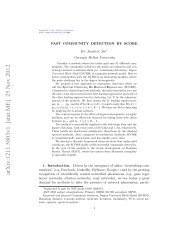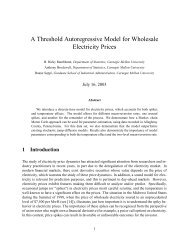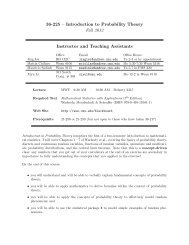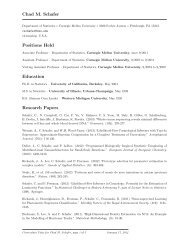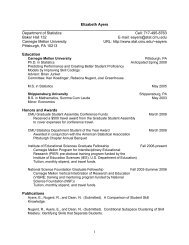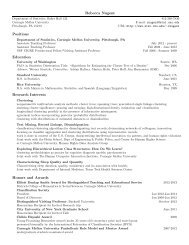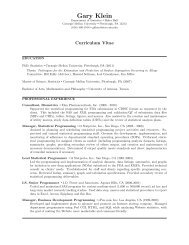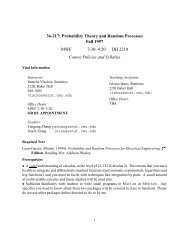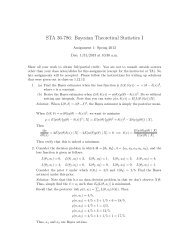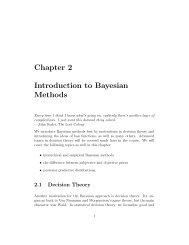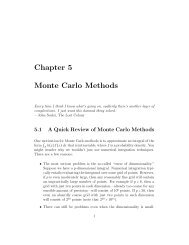Subjective Bayesian Analysis: Principles and Practice
Subjective Bayesian Analysis: Principles and Practice
Subjective Bayesian Analysis: Principles and Practice
Create successful ePaper yourself
Turn your PDF publications into a flip-book with our unique Google optimized e-Paper software.
4 Pure subjectivism<br />
We have argued that the subjective Bayes approach is successful in practice, <strong>and</strong> is invaluable<br />
for serious scientific analysis. This, however, leaves open possible criticisms of the Bayes<br />
approach from the subjective viewpoint itself. Carrying out a careful <strong>Bayesian</strong> analysis can<br />
prove very difficult. In part this is because such an analysis requires an extremely detailed<br />
level of prior probabilistic belief specification. Typically, we find it difficult to make detailed<br />
specifications in a way which genuinely corresponds to our prior beliefs. Therefore, artificial,<br />
conventional prior forms are used, often bearing only a limited relation to our prior beliefs, so<br />
that the resulting <strong>Bayesian</strong> analysis bears only a limited relation to our actual judgements.<br />
Is such a detailed specification really necessary? A true subjectivist formulation might<br />
start by recognising the limited abilities of the individual to make large collections of uncertainty<br />
specifications. It is precisely this consideration that led de Finetti, in [3], the<br />
most careful statement of the subjectivist position yet written, to chose expectation rather<br />
than probability as his primitive for the subjectivist theory. With expectation as primitive,<br />
we can assess directly whatever sub-collection of probabilities <strong>and</strong> expectations we consider<br />
ourselves able to specify at any given time, whereas, if probability is the primitive, then we<br />
must specify every probability before we can specify any expectation. Unfortunately, the<br />
liberating aspect of this approach is somewhat lost in de Finetti’s development, as changes<br />
in beliefs are still carried out by conditioning on events, which again requires a finely detailed<br />
level of prior specification (although we may give bounds on the coherent inferences<br />
consistent with any partial specification, see [10]).<br />
Therefore, we must also consider whether it is an intrinsic part of the subjectivist position<br />
that beliefs should change by conditioning via Bayes theorem. This question cuts to the heart<br />
of the Bayes position, as it is impossible to demonstrate any definitive sense in which beliefs<br />
should change by conditioning. You might think that someone, somewhere has proved that<br />
conditioning is the correct way to modify beliefs, at least under certain conditions. However,<br />
all that can be proved is results such as the following. Suppose that you specify a joint<br />
probability distribution for a collection of r<strong>and</strong>om quantities. Suppose that you also write<br />
down a rule for changing your probabilities for some of the quantities, as a function of the<br />
numerical values of the remaining quantities. If this rule for changing your probabilities is<br />
not the usual conditional probability formula, then you can be made a sure loser, in the<br />
usual sense of placing a sequence of bets that pay off depending on various combinations of<br />
outcomes of the r<strong>and</strong>om quantities.<br />
This is not a demonstration that beliefs should change by conditioning: all that it does is<br />
to eliminate non-<strong>Bayesian</strong> rules for updating beliefs in the class of rules based exclusively on<br />
current beliefs <strong>and</strong> the values of the observables. The fundamental question remains as to<br />
what relevance probabilities that are declared conditional on the outcome of certain events<br />
should hold for the actual posterior probabilities that you assign when you do learn of the<br />
outcomes. By the time that you observe the data, you may have come across further unanticipated<br />
but relevant information (or you may not, <strong>and</strong> this also is relevant information),<br />
<strong>and</strong> you may well have further general insights about the problem, by study of relevant literature,<br />
deeper mathematical treatment or careful data analysis. None of this corresponds to<br />
<strong>Bayesian</strong> conditioning. Indeed, I cannot remember ever seeing a non-trivial <strong>Bayesian</strong> analysis<br />
which actually proceeded according to the usual Bayes formalism. All of this illustrates the<br />
simple observation that there is no stronger reason why there should be a rule for going from<br />
prior to posterior beliefs than that there should be such a rule for constructing prior beliefs<br />
in the first place. (For example, any attempt to view conditional beliefs as the beliefs that<br />
you “should” hold were you to observe the conditioning event <strong>and</strong> “nothing else” is doomed<br />
to self-contradiction, as the fact that you observed nothing else was not part of the original<br />
10



